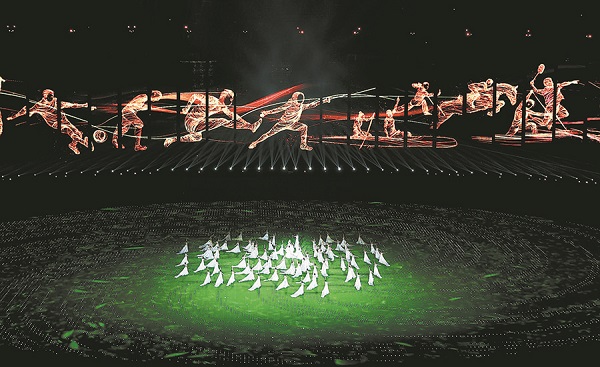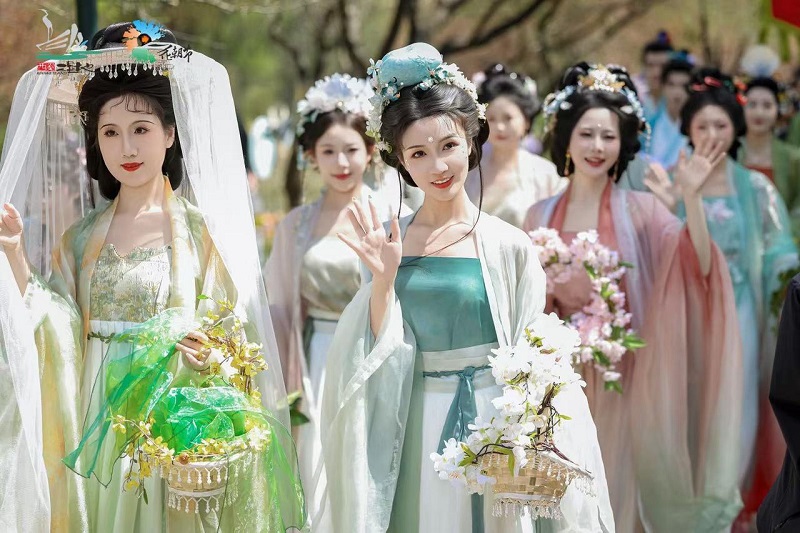Expertise takes center stage

The closing ceremony of the 19th Asian Games in Hangzhou on Oct 8. [PHOTO BY WEI XIAOHAO/CHINA DAILY]
Director of opening and closing ceremonies for Asian Games and Asian Para Games is a true professional with a command of detail, Li Yingxue reports.
From the digital torchbearer and the drifting osmanthus fragrance in the stadium, to the garden made with 40,000 lights on the lawn, the opening and closing ceremonies of the Hangzhou Asian Games and Asian Para Games showed a unique side of Hangzhou, Zhejiang province, through the fusion of technology and art.
Behind these distinctive performances was three years of continuous effort by the same backstage production team. The most dedicated manager in this team was its chief producer Wu Yan.
From planning the performance to forming the teams, from controlling budget expenditure to the implementation of the plans, every step and every detail involved the participation of 52-year-old Wu.
With more than 20 years of experience in the sector, Wu has continuously honed herself on one project after another, tirelessly refining her control over every detail. She incorporated a feminine perspective and consistently sought ways to better showcase Chinese culture in these shows.
The preparations for the opening and closing ceremonies of the Hangzhou Asian Games and Asian Para Games began in 2020.Since then, as the executive producer for these four large-scale events, Wu spent most of her time in Hangzhou.
"We worked on hundreds of plans, with numerous modifications to themes, stage designs, and other things," Wu recalls, adding that for all four performances, they also prepared an alternative set of plans in case of extreme weather conditions.
"Our advantage as a directing team responsible for all four ceremonies was that we could highlight the distinct features of each. Our aim was to vividly showcase the elements of Hangzhou that we wanted to present, such as osmanthus flowers, tea, and other aspects. We worked to achieve perfection in the presentation of each element," Wu says.
Although the four performances took place at the same venue, Wu explained that changes in stage design, visual effects, and the participants created different experiences for the audience. "For the Asian Games closing ceremony, we created a grand garden, while for the Asian Para Games closing ceremony, we designed a performance that was very pure, in the hopes that everyone could quietly feel the beauty in people with disabilities," Wu adds.
Dong Xueting, one of the members of the production team for the four performances, has been working closely with Wu for the past six months.
She believes that Wu is a very strict and detail-oriented person. "Her guidance is meticulous; even typos in the scripts will be pointed out. Over time, she has instilled good work habits in us," Dong says.
"But our work is only a small part of what she oversees. She has to coordinate with various departments, processes, and roles. Despite the complexity of her responsibilities, she has her own logic and organizes everything very clearly," Dong adds.
The team had five meeting rooms in their office area in Hangzhou, dedicated to each of the four performances and discussions on music or other content. Over the past six months, Wu shuttled between these five meeting rooms from morning to night.
Dong explains that the team often finished work as late as 2 or 3 in the morning, but by 8 am the next day, Wu was back in the office, full of energy. "She always appeared with exquisite makeup, looking radiant. She worked very hard, but she also knew how to enjoy life," Dong says.
Dong believes that Wu has portrayed the delicate and soft side of women in the four ceremonies of the Asian Games and Asian Para Games.
During the closing ceremony of the Asian Para Games, Wu and her team invited a girl volunteer who narrates movies for the visually impaired to explain how the torch was extinguished to blind children in the audience. "I believe they could understand and feel the atmosphere of the live event," Wu said.
During the opening ceremony of the Asian Para Games, the performances of two "blade warriors" (amputees wearing lower-leg prosthetics) stunned the audience. Wu explained that initially, the two were arranged as A and B roles, with one serving as the understudy for the other. However, after several rehearsals, the directing team found both to be outstanding and decided to have them perform together.
"The way they ran was soul-stirring. After adding emotion to many performances, they became something that the audience could truly understand," Wu says.
During the closing ceremony of the Asian Games, the highly anticipated digital torchbearer waved goodbye to the crowd and made a heart gesture before disappearing into the night sky.
Colleagues on-site noticed that Wu was in tears. She explained that witnessing the departure of the digital figure stirred both excitement and a sense of reluctance in her heart.
She also felt that this performance had been incredibly challenging because the transition from the track and field competition to turning the venue into a performance space had to be done in 24 hours, and the actors only had a day to rehearse.
Multirole career
Wu's professional career did not begin in the entertainment industry. At the turn of the millennium, while in a managerial position, she participated in organizing a New Year's Eve countdown event. It was during this time that she discovered her interest in large-scale event organization. Subsequently, she resigned and joined a company specializing in event operations.
Over the past 20 years, she has grown from coordination to directing, producing, and ultimately becoming an executive producer, gradually evolving into a versatile professional who can handle various roles independently.
In the journey to become an executive producer for large-scale events, Wu found that each previous position she held helped prepare her for the next step. "When you have experience writing proposals and executing plans, managing becomes more effortless, and at the same time, you can pass on your experience to others," she says.
Whether it's hosting events, award ceremonies, or producing performances for the opening and closing ceremonies of large sports events, Wu's presence is visible on numerous levels.
She has served as a producer for many film festival award ceremonies. "For an award ceremony, involving presenters, award recipients, and winners, each award may require coordination with five or six individuals, resulting in a myriad coordination tasks for the ceremony," Wu explains.
One award ceremony that left a lasting impression was a college student film festival in 2003, held on the sports field of Beijing Normal University.
"At the time, all the top-notch celebrities came to support the event, feeling that it was a great cause," Wu says, recalling that the weather was particularly good on the day of the event, but it started raining as soon as the ceremony concluded.
Having also served as a film producer, Wu believes that what sets films and large-scale events apart is that filmmaking is a meticulous and gradual process, while large-scale events are fixed-time tasks.
"The production of a large-scale event is a reverse scheduling process, where each time point has to achieve specific progress, and everything needs to be tightly interconnected," Wu says.
"The job of a producer is a bit like making sugarcoated hawthorns on a stick. It requires stringing together every aspect of an event from scratch. This includes planning, proposals, implementation, final presentation, and even promotion," Wu adds.
Although the performances of the opening and closing ceremonies of the Asian Games have concluded, the shows will continue in Hangzhou — and will be staged on Xianghu Lake, becoming a permanent performance project, which is expected to debut next May.
Wu revealed that in addition to the spectacular opening and closing ceremony programs, the performances will be adjusted to take into account the lakeside setting by using the sky as the backdrop, the water as the stage, and the mountains as the scenery.
"Besides creating this show, we also plan to develop cultural features in the surrounding area, to reflect the elegance of Xianghu Lake and the Song Dynasty (960-1279)," Wu says.
In November, Wu was busy working in Xi'an, Shaanxi province, where she took on the role of producer for the Omni Chang'an performance project with renowned director Zhang Yimou as chief director.
Following this, she is gearing up for the opening ceremony of the 14th National Winter Games scheduled to take place in the Inner Mongolia autonomous region in February.
Facing a series of consecutive new tasks, Wu has never stopped pondering how to make each performance more perfect, and how to better showcase China's traditional culture.
"The combination of our traditional culture with technological performance is definitely a future trend," Wu says. "In the future, what we need to do more is to give our traditional culture, including intangible cultural heritage, an artistic and technological packaging."
-
Xixi Wetland invites visitors to Huazhao Festival
March 25, 2025
-
Hangzhou sets standard for concert hosting
March 19, 2025
-
What is making Hangzhou the new tech powerhouse of China?
March 10, 2025
-
Inside Hangzhou: China's high-tech dream factory
March 12, 2025



